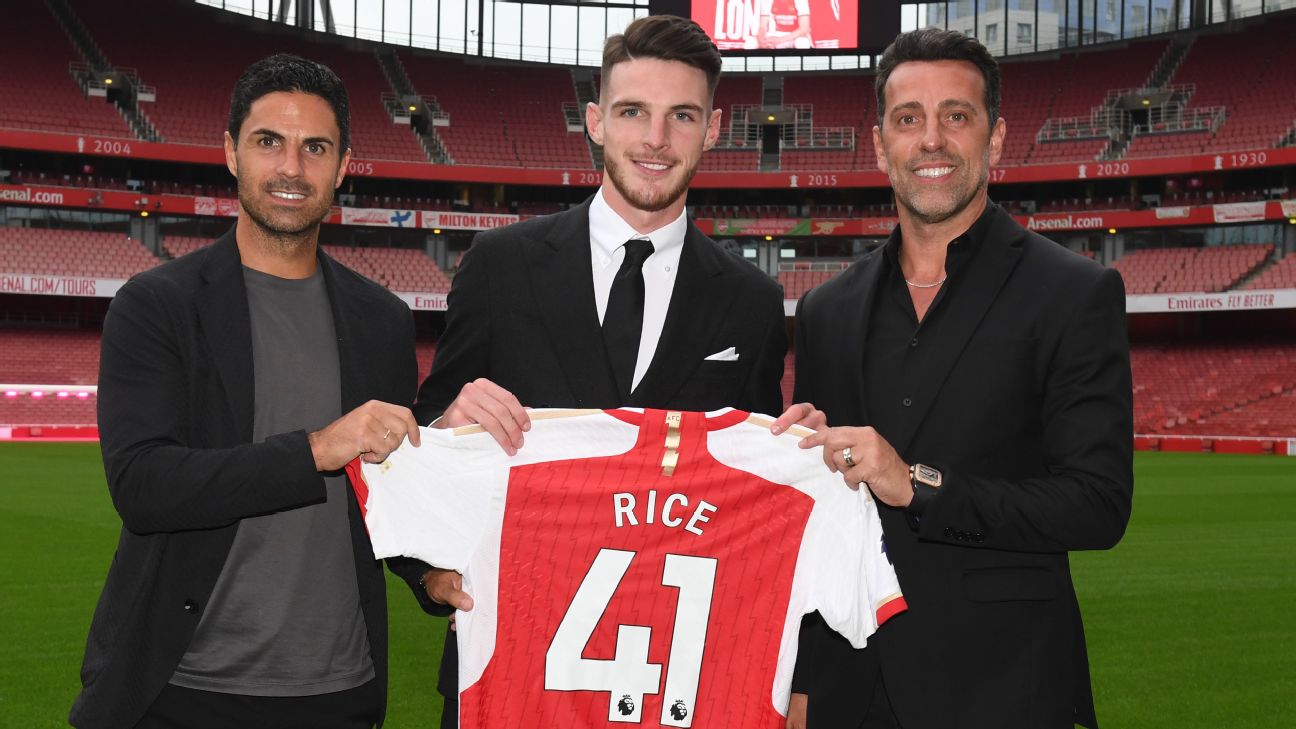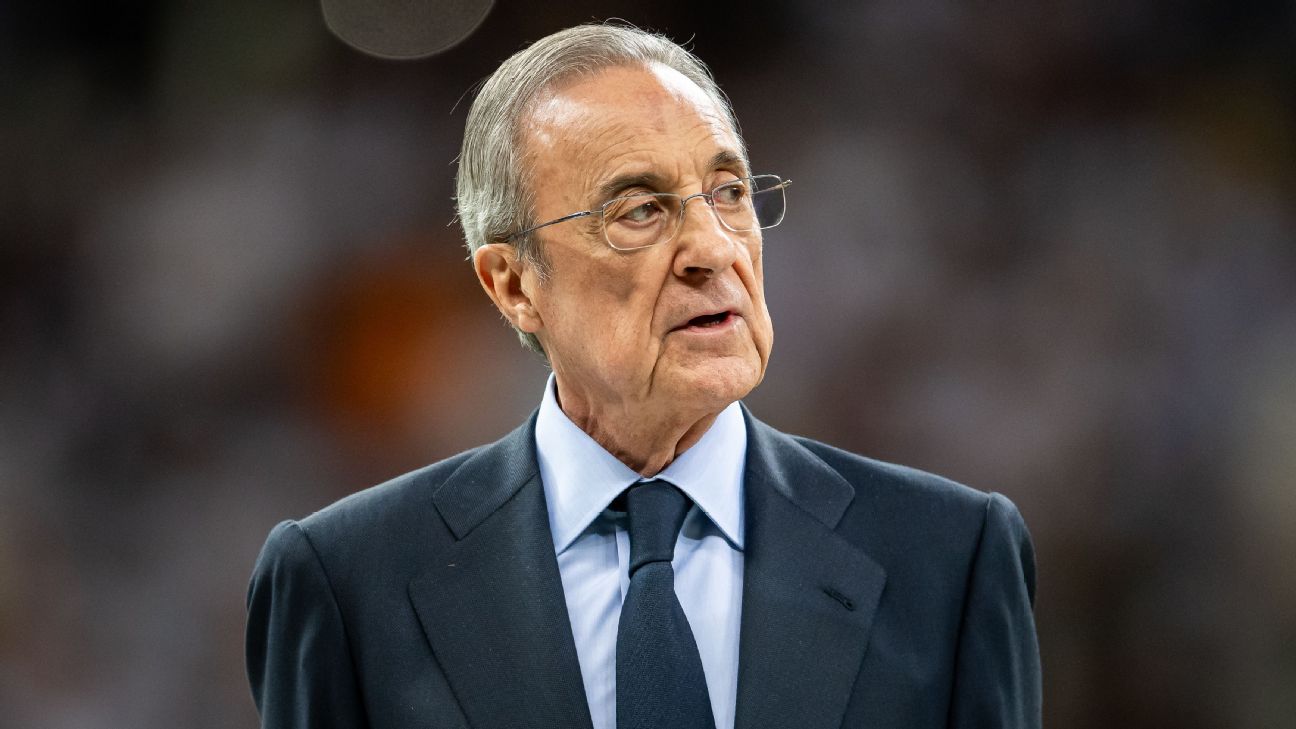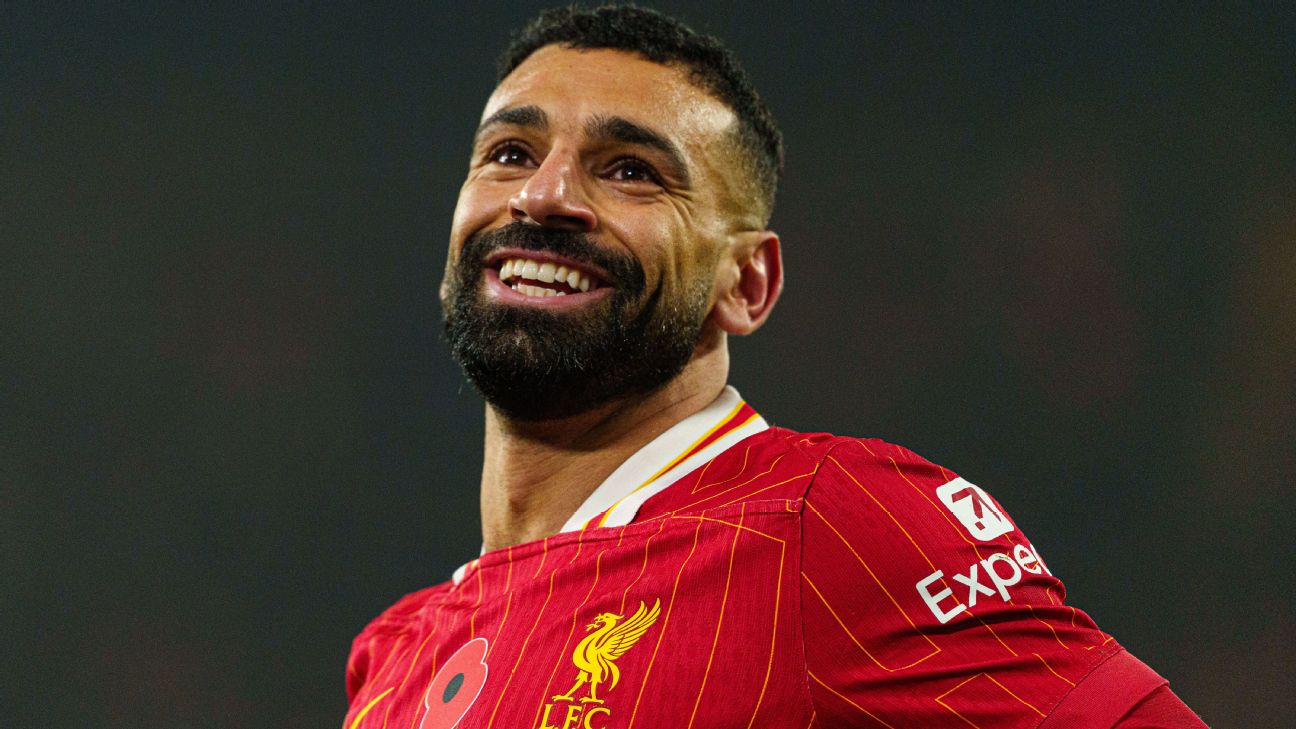When Arsenal announced Mikel Arteta had signed a new contract on Sept. 12, the Premier League club’s manager was effusive in his praise of sporting director Edu Gaspar.
“He was the first one to knock on my door before I joined, and he made a big call to put all the trust he had in me to drive this massive boat in the direction and the way we both had a vision to do it — and it’s been pivotal,” Arteta said. “Our relationship has been incredibly strong, very honest, very transparent and I’m very grateful for that.”
At the same time, Edu reciprocated that sentiment. “We have a strong belief in what we are doing and what we want to achieve together,” he said. “Mikel’s new contract gives us stability and clear direction as we aim for new heights.”
But on Monday, less than two months later, the Gunners announced that Edu had resigned. Sources have told ESPN he is set to head up Nottingham Forest owner Evangelos Marinakis’ multiclub model, which includes Greece’s Olympiacos and Portugal’s Rio Ave.
But how key a figure has Edu been for Arsenal? Why are they losing him in such unexpected fashion? And where will they go from here?
How important was Edu to Arsenal?
Edu joined the club in 2019 after spending three years working with the Brazil national team as their technical director. With Edu having made 127 appearances for Arsenal as a midfielder in the “Invincibles” squad that won the 2003-04 Premier League title without losing a game, his appointment was greeted warmly by many supporters. He was brought in as part of a wider attempt to add sporting expertise following the departure of long-serving manager Arsene Wenger a year earlier.
Some of Edu’s early transfers were criticised, however, as fans questioned the closeness of his relationship with certain agents, but that negativity dissipated as a radical overhaul of the squad began following Arteta’s appointment to replace Unai Emery in December 2019. The Gunners were ruthless, paying up the contracts of nine first-team players to leave the club and, with that allied to concerted — and often intelligent — spending, results improved over time and Arsenal became serious contenders for the Premier League title again.
Edu was promoted from technical director to sporting director in November 2022 as a reflection of his influence, the club’s first-ever occupant of both positions. The move gave him formal responsibility for the academy as well as men’s and women’s football. Sources have told ESPN he was instrumental in recent modifications to Arsenal’s training base at London Colney and was often the troubleshooter in any disputes that arose there. Arteta used him as a sounding board — one source suggested Edu was one of the few people the Spaniard could “vent” his frustration at — and his charming, charismatic personality made him a popular figure internally and externally.
Arteta described their “special chemistry” when reflecting on Edu’s exit on Tuesday. The pair were both essential in reestablishing core club values and driving up standards to improve the culture, which had drifted into mediocrity during the latter part of Wenger’s 22-year reign, creating a stagnant feel Emery was unable to shake.
How did his departure arise?
Reports of interest in Edu from elsewhere surfaced in Brazil over the summer. A source told ESPN that, around the end of the summer transfer window, senior figures at the club held an informal conversation with the 46-year-old in which those rumours were discussed but that nothing was explored further. There was no indication at that stage that he had a formal offer to consider.
The situation gathered pace in the past fortnight, however. Another source told ESPN that Arsenal’s hierarchy became aware that something could be in the offing around two weeks ago and that internal discussions began. Dialogue involving Edu, Arteta, executive vice-chair Tim Lewis, managing director Richard Garlick and co-chair Josh Kroenke accelerated last weekend.
However, Edu had not indicated any intention to leave to a wider audience and did so only on Monday morning, when he began to circulate the news at London Colney. Multiple sources have told ESPN there was genuine shock among staff.
One source strongly rejects any notion that there was a power struggle that led to Edu’s exit, with the situation more that he was made a hugely lucrative offer that promised a much wider remit across several clubs than a one-club sporting director position could ever provide. Arsenal are technically part of a multiclub operation, given owners Kroenke Sports Enterprises (KSE) also count MLS franchise the Colorado Rapids among several sports teams in their stable, but they do not pool players in the same way.
However, working with Marinakis offers something immediate, and reports have suggested Edu will be paid in the region of £5 million a year to oversee Forest, Olympiacos and Rio Ave. One source suggests that Arsenal made a counteroffer to improve Edu’s salary but that that was swiftly rejected as his mind was made up.
There had been minor disagreements involving Edu. Sources have told ESPN that the club were split over whether to sign Spain midfielder Mikel Merino from Real Sociedad, with Arteta particularly keen on adding his experience to the squad. Similarly, there was frustration at the loss of promising 16-year-old striker Chido Obi-Martin to Manchester United, with sources telling ESPN that Edu’s relationship with the player’s agent had become strained. But sources insist these were the sort of small issues that inevitably crop up in such a role and that Edu’s departure was greeted with both surprise and sadness by staff.
Sources said that Edu was emotional in addressing players and staff at London Colney on Tuesday when saying his final goodbyes before the squad flew to Italy for a Champions League game at Inter Milan. Sources added that he leaves on good terms with senior figures at the club.
Gab Marcotti and Julien Laurens debate if Arsenal made a mistake in the transfer window by not signing an alternative option to forward Kai Havertz.
What will Arsenal do now?
It has been confirmed to ESPN that Edu has begun a six-month notice period and will not be involved in the day-to-day running of the club during that time. He cannot therefore begin work for Marinakis until late April/early May. In the meantime, Edu assistant Jason Ayto will step up on an interim basis and assume some of the responsibilities that were vacated while the search for a successor begins.
Arsenal’s football management unit comprises Arteta, Garlick, Lewis and James King reporting up to KSE, specifically owner Stan Kroenke and, more often, son Josh. King starts work at the club on Monday having rejoined to take up Garlick’s old role as director of football operations, after Garlick became managing director earlier this year when Vinai Venkatesham left.
Sources have told ESPN that several executives will fly out to Los Angeles on Monday to meet with the Kroenkes to discuss plans for the next two transfer windows. This meeting always takes place during the November international break and was not a specific response to Edu’s departure.
However, there is no succession plan in place given how central Edu was to Arsenal’s strategy and the unexpected nature of his departure. The club will hire a replacement for Edu, but there is no timescale set for an appointment and a proper process will be followed. Arsenal have previously appointed individuals with a connection to the club in prominent roles — Edu, Arteta and academy boss Per Mertesacker were all former players. However, that was a happy coincidence rather than a strategy, and therefore the net will be cast much wider.
The club are yet to identify the right profile for a sporting director — some have a skill set suited to negotiating, others to mediation or presentation. There is an acknowledgment that Edu is an extremely difficult character to replace like-for-like given he offers the all-round package of experience and success in the role while also being a club legend.
Sources said there is no particular urgency in the context of transfers with the January transfer window looming. The mood around the club suggests that they are not likely to be particularly proactive in January, instead ready to respond if injuries deepen or a particular long-term target unexpectedly becomes available.
Edu’s exit has also not disrupted the appointment of a new Arsenal women’s head coach following Jonas Eidevall’s resignation. A source told ESPN the process is being led by director of women’s football Clare Wheatley and Ayto, with an appointment not thought to be close and Edu therefore not involved at such an early stage of the process.
There is also confidence drawn from King’s prior knowledge of the club — he left Arsenal in 2022 after six years to join the Professional Footballers’ Association as general counsel — and Ayto’s progression as Edu’s understudy. Sources have told ESPN that Ayto played an important role in reorganising Arsenal’s scouting system under Edu and has impressed senior figures at the club in the way he supported Edu on transfer policy. Ayto is also leading Arsenal’s ongoing attempts to become more clinical and aggressive with their academy, increasing the budget to sign players in younger age groups and developing player-specific pathways to first-team football rather than the catch-all approach of before.
Meanwhile, Garlick will take on some of Edu’s responsibilities and has experience in transfer negotiations from his previous role at Arsenal and past job at West Bromwich Albion. A source also said that the club feel they are in a strong place regarding contracts, given the club’s big names are all settled and tied down on relatively long-term deals.
That said, Edu’s exit creates a significant hole to fill and a degree of uncertainty about the future. Arteta claimed publicly that “the excitement, the passion, the understanding of where we want to take this journey remains intact.”
Time will tell whether Edu’s departure is a surprise bump in the road or a turning point Arsenal will come to regret. They had an Invincible, but they might feel a little vulnerable now.



